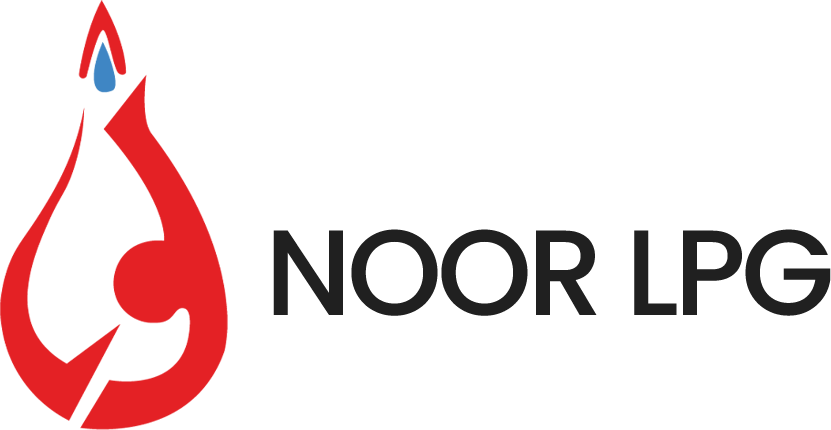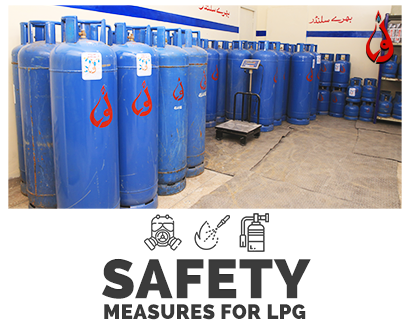Safety Measures for LPG

Safety Measures for LPG
Liquefied Petroleum Gas (LPG) is becoming an increasingly popular fuel due to shortage and unavailability of natural (SUI) gas. The product has made its way to both, household and commercial consumers including restaurants, businesses and industries. LPG is a mixture of Propane & Butane, stored as a liquid but delivered as a gas.
It is primarily used for cooking, space and water heating, as a fuel source for numerous industries as well as an automotive fuel. Globally there are more vehicles operating on LPG than CNG, making it both a safer and economical fuel for the motorist.
LPG is colorless and odorless, and in order to detect a leak, a substance known as Ethyl Mercaptan is added to it which has a pungent smell.
LPG is highly flammable and therefore care must be adopted to ensure that it is handled safely. The safety of your family, of employees, and that of each stakeholder should be of prime importance.
Safe Handling of LPG Cylinders:
• Always read the instructions provided on the Safety Label of the Cylinder.
• Cylinders should always be kept in an upright position.
• Cylinders should always be kept in well-ventilated areas. DO NOT keep cylinders in the basement.
• Flexible Hose Pipes connecting the cylinder to the stove/appliance must be in good condition and without cracks or damage. Replace worn out pipes immediately.
• Never check for leaks with a match or open flame.
• Keep access to the cylinders unrestricted.
• Cylinders should not be rolled on the floor but must be tilted and rolled across (as shown in the diagram).

• DCP (Dry Chemical Powder) fire extinguishers should be kept nearby (in the case of commercial use of LPG by Restaurants and Industries)
Leak Detection
Due to the presence of Ethyl Mercaptan, an LPG leak can be easily detected. Another way to check for leaks is to use a soap solution on the area around the valve. In case bubbles begin to form, it means there is a leak.
In the event of a leak the following steps must be adopted:
• Turn off the LPG Regulator.
• Disconnect the Cylinder and keep it in an open space with access to ventilation.
• Do not turn on any electric switches or light a flame.
• Call your LPG Dealer or in the event of a fire call the Fire Ambulance.



buy proscar brand[/url]
nolvadex tamoxifen for sale uk
https://ivermectinstr.com/# stromectol tablets for humans
https://ivermectinstr.com/# ivermectin 3mg
anti fungal pills without prescription: medicine for ed – generic viagra without a doctor prescription
top rated ed pills: ed drugs – doctors for erectile dysfunction
when will viagra be generic viagra without a doctor prescription – generic viagra walmart
buy cialis online best price buy cialis online europe – buy cialis online cheap
[url=https://ivermectinop.com/]ivermectin 4000 mcg[/url] [url=https://buyrxtablets.com/]clomid fertility[/url] [url=https://ivermectinzt.com/]stromectol medicine[/url] [url=https://xrpills.com/]buy accutane canada[/url]
[url=http://buysildenafilpills.com/]sildenafil generic otc[/url] [url=http://bestviagrapills.com/]buy viagra 100 mg online[/url] [url=http://viagrafmed.com/]sildenafil otc uk[/url] [url=http://viagraoft.com/]viagra 25mg for sale[/url] [url=http://cialisfmed.com/]can you buy cialis otc[/url]
[url=https://cheapestsildenafil.com/]sildenafil 50mg tablets coupon[/url] [url=https://anycialis.com/]where can you get cialis[/url] [url=https://viagracpill.com/]generic viagra cost in canada[/url] [url=https://cialisexpress.com/]chewing cialis tablets[/url] [url=https://ivermectinpn.com/]ivermectin 500ml[/url]
[url=http://dwpills.com/]buy lexapro online without prescription[/url]
[url=https://opivermectin.com/]stromectol online canada[/url]
[url=http://tadalafilworx.com/]tadalafil 10 mg canadian pharmacy[/url]
[url=http://tadalafilworx.com/]tadalafil tab 10mg[/url]
[url=http://sildenafileasy.com/]sildenafil brand name in india[/url]
hydroxy-chloroquine plaquenil – plaquenil generic cost
[url=https://healthsupl.com/]provigil online australia[/url]
[url=http://onlinemediorder.com/]provigil 200[/url]
[url=http://ivermectinbestbuy.com/]buy ivermectin nz[/url]
[url=https://ivermectinbestbuy.com/]can you buy stromectol over the counter[/url]
[url=http://ivermectinbestbuy.com/]ivermectin 2mg[/url]
[url=http://worxtabs.com/]stromectol for humans[/url]
lasix medication buy furosemide – lasix 100mg
[url=http://worxtabs.com/]buy liquid ivermectin[/url]
[url=https://genericivermectin.com/]ivermectin otc[/url]
[url=http://ivermectinbestbuy.com/]stromectol over the counter[/url]
[url=http://ivermectinbestbuy.com/]ivermectin buy australia[/url]
[url=http://ivermectinbestbuy.com/]stromectol online[/url]
[url=https://ivermectinbestbuy.com/]ivermectin purchase[/url]
[url=https://genericivermectin.com/]ivermectin virus[/url]
[url=http://worxtabs.com/]stromectol over the counter[/url]
generic cialis cost
[url=http://ivermectinbestbuy.com/]ivermectin[/url]
[url=http://genericivermectin.com/]ivermectin price usa[/url]
[url=http://genericivermectin.com/]ivermectin brand name[/url]
[url=http://genericivermectin.com/]stromectol medication[/url]
[url=http://worxtabs.com/]buy ivermectin cream for humans[/url]
ciprofloxacin order online buy generic ciprofloxacin – ciprofloxacin
[url=http://ivermectinbestbuy.com/]stromectol online pharmacy[/url]
[url=https://genericivermectin.com/]stromectol 3 mg tablets price[/url]
[url=https://worxtabs.com/]stromectol covid[/url]
[url=https://worxtabs.com/]ivermectin 250ml[/url]
[url=http://ivermectinbestbuy.com/]order stromectol online[/url]
[url=http://genericivermectin.com/]buy stromectol online uk[/url]
[url=http://ivermectinbestbuy.com/]stromectol cost[/url]
[url=http://worxtabs.com/]ivermectin tablets order[/url]
[url=https://worxtabs.com/]stromectol prices[/url]
[url=http://genericivermectin.com/]ivermectin 4[/url]
[url=http://worxtabs.com/]ivermectin cream 1[/url]
order cialis 20mg buy cialis online in usa rergztj – cialis on line pharm
[url=http://genericivermectin.com/]where to buy stromectol online[/url]
[url=http://ivermectinbestbuy.com/]ivermectin 12[/url]
[url=http://worxtabs.com/]ivermectin 1 cream generic[/url]
[url=https://worxtabs.com/]ivermectin otc[/url]
[url=http://ivermectinbestbuy.com/]ivermectin lotion[/url]
[url=http://worxtabs.com/]ivermectin 10 ml[/url]
[url=http://worxtabs.com/]stromectol price in india[/url]
[url=https://worxtabs.com/]stromectol ivermectin tablets[/url]
[url=http://ivermectinbestbuy.com/]ivermectin 0.5[/url]
[url=http://ivermectinbestbuy.com/]stromectol 3mg tablets[/url]
[url=https://worxtabs.com/]cost for ivermectin 3mg[/url]
[url=https://genericivermectin.com/]stromectol online canada[/url]
[url=http://genericivermectin.com/]ivermectin 200[/url]
[url=http://ivermectinbestbuy.com/]ivermectin 5[/url]
[url=http://genericivermectin.com/]stromectol 3mg tablets[/url]
[url=https://worxtabs.com/]stromectol for sale[/url]
[url=http://genericivermectin.com/]ivermectin buy australia[/url]
[url=https://genericivermectin.com/]stromectol tablets for humans for sale[/url]
generic viagra online canada viagra in cape town – viagra for cheap
[url=http://ivermectinbestbuy.com/]ivermectin 0.1 uk[/url]
[url=http://ivermectinbestbuy.com/]generic name for ivermectin[/url]
[url=https://genericivermectin.com/]ivermectin malaria[/url]
[url=https://ivermectinbestbuy.com/]ivermectin 0.1 uk[/url]
[url=http://genericivermectin.com/]ivermectin 3 mg tablet dosage[/url]
[url=http://worxtabs.com/]ivermectin 90 mg[/url]
[url=https://finpeciapills.com/]finpecia 1 mg[/url]
[url=http://tmpills.com/]cymbalta buy online uk[/url]
benefits of viagra for men genelic viagra – viagra aus
[url=http://fdcpharmacy.com/]canadian pharmacy store[/url]
[url=http://adviagra.com/]buy generic viagra europe[/url]
[url=http://ivermectinpillsotc.com/]ivermectin oral solution[/url]
[url=https://viagraaf.com/]where can i order generic viagra online[/url]
[url=https://viagraos.com/]cheap viagra for sale online[/url]
[url=http://ivermectinlp.com/]ivermectin usa price[/url]
[url=http://drugstorent.com/]big pharmacy online[/url]
[url=http://healthpntr.com/]tamoxifen tablets india[/url]
[url=http://tadalafilchm.com/]where to purchase tadalafil[/url]
[url=http://pharmacylong.com/]canadian pharmacy generic viagra[/url]
[url=http://sildenafilx100.com/]sildenafil 50mg tablets uk[/url]
[url=http://viagrapillsrx.com/]cheap viagra online no prescription[/url]
[url=http://dupills.com/]buy augmentin online uk[/url]
[url=https://tadalafilftab.com/]tadalafil tablets 2.5 mg[/url]
[url=http://viagrafit.com/]sildenafil online united states[/url]
[url=http://ivermectinz.com/]ivermectin 24 mg[/url]
viagra melbourne victoria buy viagra brand online – cialis vs viagra vs kamagra
[url=https://tadalafilcheapest.com/]20 mg tadalafil cost[/url]
[url=http://adviagra.com/]buy viagra online canadian pharmacy[/url]
[url=http://cialistn.com/]how can i get cialis[/url]
[url=http://tadalafilnov.com/]tadalafil purchase[/url]
[url=http://sildenafilmedx.com/]sildenafil rx coupon[/url]
[url=https://crtabs.com/]buy plaquenil[/url]
[url=https://fdcpharmacy.com/]safe canadian pharmacies[/url]
[url=http://buysildenafiltabs.com/]sildenafil soft tablets 100mg[/url]
[url=http://agcialis.com/]cost of tadalafil in mexico[/url]
[url=http://finpeciapills.com/]finpecia online[/url]
[url=http://prednisonetablet.com/]how can i get prednisone[/url]
[url=http://sildenafilcmed.com/]viagra 50 mg price[/url]
[url=https://buysildenafilcit.com/]sildenafil otc usa[/url]
[url=http://tadalafilgenp.com/]where can i get generic cialis[/url]
[url=http://tadalafilrtab.com/]tadalafil tablets online[/url]
[url=http://cialispm.com/]cialis pro[/url]
[url=http://tadalafilx20.com/]generic cialis free shipping[/url]
[url=http://buyivermectintabs.com/]stromectol usa[/url]
[url=https://tadalafilx20.com/]genuine cialis canada[/url]
[url=https://viagrawmed.com/]viagra canada price[/url]
[url=http://viagrawmed.com/]buy sildenafil 20 mg[/url]
[url=https://ivermectinsx.com/]ivermectin 0.08 oral solution[/url]
[url=http://cialishtl.com/]cialis paypal uk[/url]
[url=http://viagradh.com/]viagra india buy[/url]
[url=http://ivermectinds.com/]ivermectin cost uk[/url]
[url=https://prednisoneforsale.com/]prednisone 10mg for sale[/url]
[url=http://sildenafilhcp.com/]buy viagra online us pharmacy[/url]
[url=http://tadalafilgenp.com/]cialis buy[/url]
[url=https://ogrmeds.com/]motilium generic brand[/url]
[url=http://sildenafilcmed.com/]sildenafil 200mg[/url]
[url=http://buysildenafildrug.com/]buy sildenafil 50mg[/url]
[url=https://cialishp.com/]cialis gel caps[/url]
buy doxycycline 100mg doxycycline for sale – doxycycline tetracycline
[url=http://cialisrpill.com/]tadalafil over the counter usa[/url]
[url=http://sildenafilntab.com/]generic viagra online canadian pharmacy[/url]
[url=https://buyivermectinotc.com/]ivermectin oral[/url]
[url=https://ivermectinonlinepharmacy.com/]ivermectin where to buy[/url]
[url=http://buytadalafilnorx.com/]20 mg tadalafil buy[/url]
[url=https://viagraam.com/]order brand viagra online[/url]
cheap cialis
[url=http://cialisrmed.com/]cialis pharmacy uk[/url]
[url=http://viagraedpills.com/]viagra no rx[/url]
[url=http://cialishp.com/]cialis generic mexico[/url]
[url=https://buyivermectintabs.com/]ivermectin stromectol[/url]
[url=http://modafinilipharm.com/]compare provigil prices[/url]
[url=http://tadalafilorderonline.com/]buy tadalafil without prescription[/url]
[url=http://viagraht.com/]where can i buy over the counter sildenafil[/url]
[url=http://buynolvadexpills.com/]nolvadex 40 mg[/url]
[url=http://tadalafilptab.com/]how to order cialis online[/url]
[url=http://viagrasd.com/]purchase viagra without prescription[/url]
[url=https://hydroxychloroquiene.com/]plaquenil 200[/url]
[url=https://buyingviagrapills.com/]viagra tablet[/url]
[url=http://tadalafilr.com/]tadalafil otc[/url]
[url=http://tadalafilr.com/]cheap tadalafil 5mg[/url]
[url=https://cheapcialistabs.com/]cialis 5mg tablets australia[/url]
[url=http://cialisdb.com/]cialis buy no prescription[/url]
[url=https://sildenafilcitratetabs.com/]sildenafil prescription uk[/url]
[url=http://agsildenafil.com/]viagra for sale in united states[/url]
[url=http://viagralb.com/]viagra brand generic[/url]
[url=http://hydroxychloroquiene.com/]plaquenil 400 mg[/url]
[url=http://isotretinoinacu.com/]120mg accutane[/url]
[url=https://buyingviagrapills.com/]viagra india online purchase[/url]
[url=http://cialisnpill.com/]tadalafil purchase[/url]
[url=https://purchaseivermectin.com/]stromectol tablets uk[/url]
buy medications online prescription drugs without prior prescription – medication for ed dysfunction
[url=https://cialisef.com/]cheap cialis 5mg[/url]
[url=http://sildenafilcitratesale.com/]sildenafil 50 mg tablet coupon[/url]
[url=https://pxmeds.com/]desyrel otc[/url]
[url=http://nolvadexmedication.com/]tamoxifen citrate nolvadex for sale[/url]
[url=http://xfcialis.com/]buy daily cialis online[/url]
[url=https://kamagrasilcit.com/]buy kamagra jelly in london[/url]
[url=http://cymbaltabuy.com/]cymbalta 20 mg[/url]
[url=http://tadalafilnpro.com/]tadalafil from mexico[/url]
[url=http://tadalafilbtab.com/]tadalafil over the counter usa[/url]
[url=http://cialisdb.com/]price of tadalafil 5 mg[/url]
ed medication prescription drugs without doctor approval – new ed treatments
[url=http://viagrash.com/]genuine viagra australia[/url]
[url=http://cialisud.com/]can i buy cialis online[/url]
[url=https://cymbaltabuy.com/]cymbalta coupon[/url]
[url=https://pharmacywg.com/]super pharmacy[/url]
plaquenil 100mg tablets hydroxychloroquine – plaquenil headache
[url=http://cialisnpill.com/]best buy cialis[/url]
[url=http://agsildenafil.com/]generic viagra soft 100mg[/url]
[url=http://tadalafilitab.com/]tadalafil price uk[/url]
[url=http://sildenafilbmed.com/]can i buy sildenafil over the counter[/url]
[url=https://lisinoprilforsale.com/]lisinopril 1.25 mg[/url]
[url=https://modafinilquick.com/]modafinil pills for sale[/url]
[url=http://sildenafilxr.com/]sildenafil 10 mg tablet[/url]
[url=https://hydroxychloroquinepharm.com/]plaquenil 150 mg[/url]
[url=https://lisinopriltablets.com/]how to order lisinopril online[/url]
[url=https://tadalafilvv.com/]brand cialis for sale[/url]
lexapro generic brand name Escitalopram – lexapro escitalopram
[url=http://paxiltablets.com/]paroxetine 30 mg tablet[/url]
[url=https://bestivermectinpills.com/]stromectol generic[/url]
[url=http://viagravmed.com/]viagra pill cost usa[/url]
[url=https://tadalafiletab.com/]generic cialis tadalafil uk[/url]
[url=http://besthydroxychloroquine.com/]plaquenil medicine[/url]
[url=http://sildenafilopill.com/]sildenafil 100mg[/url]
[url=http://ecviagra.com/]buy cheap viagra usa[/url]
[url=http://ddrpill.com/]trazodone 50mg capsules[/url]
[url=http://paxiltablets.com/]paxil 25[/url]
[url=http://celexasale.com/]citalopram price[/url]